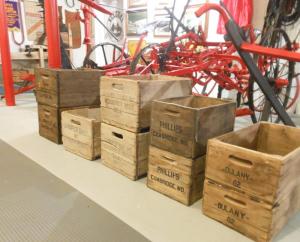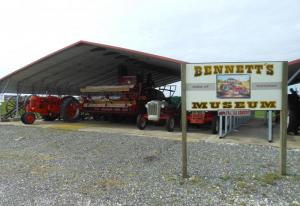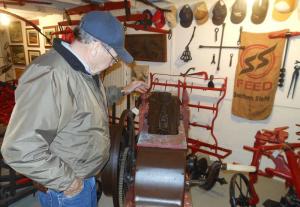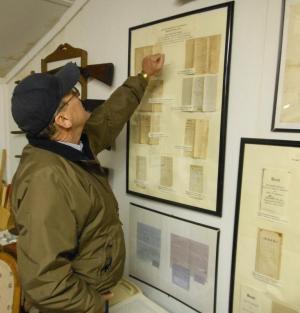Horse-drawn plows, hand-fed corn shellers, dozens of toy tractors and hand tools from two centuries ago are just a small part of the Bennett Farm Museum in Milford.
"It's something my dad started in the late '90s after he was done farming," said Fred A. Bennett III, 70, of his dad, Fred A. Bennett II, during a recent tour. "It's a disease, but we keep looking for stuff to add. There's quite a story here."
Every year, millions of people drive by the Bennett Farm Museum's southbound Route 1 exhibit of large old farming equipment that's generations removed from being useful, without realizing that's really just a small portion of the museum.
The good stuff, the stuff that really harkens back to a bygone era of farming - lima bean peelers, stationary viners, collections of Milford-related farming goods, hand-cranked grain cleaners, hog pots, old trucker-style farming hats and literally hundreds of other pieces – is located in an old cattle barn just up the road on the northbound side of Route 1, on land that Bennett, or someone in Bennett's family, has called home since the early 1800s.
"I've lived all but four years of my life in this house," said Bennett, pointing to the farmhouse next to the barn.
One of the first things a person notices about the farm's homestead is that it is definitely a working farm, but also extremely cared for. There are no ruts in the crushed-stone driveway. The garage where farm equipment is fixed is actually clean, with all the different nuts, bolts, screws and small parts needed to do the fixing organized by shape and size. It would take a visitor weeks to figure out where everything is, but it's clear that things are organized in a way that any of the employees would know exactly where to look if they needed something.
When Bennett began the tour the barn was chilly, but he turned on the heater and it only took about 10 minutes for the space to heat up. When asked about what kind of heating system was hooked up, Bennett smiled, and said a chicken house heater. He said right after hatching, baby chicks need those large chicken houses to be at 90 degrees for a couple of days, and the heaters have to be powerful enough to do the job.
"We've got one of those for this place," said Bennett.
The Bennett Farm was recognized by the state as a Century Farm in the late 1980s. In a room off the museum, Bennett has the land deeds and original mapped- out plots framed in the barn to prove it.
"We had to have this stuff to be recognized as a Century Farm by the state," said Bennett proudly.
There's more than just deeds. In land abutting the homestead, on a mound of ground unusual in Delaware's corn fields, is a gravestone marking some of Bennett's earliest relatives, the Deputy family, which dates back to the early 1800s.
This grave stone is fairly new, said Bennett. This used to be where the cows grazed, and they would step all over the original grave marker, he said with a shrug of indifference that seemed to acknowledge how it sounds to have a cow pasture on the family's gravesite. The shrug also said his relatives would be rolling over in their graves if they knew land wasn't being used on their behalf.
Even now, the land is being used - in a few months the gravestone won't be visible because of the corn stalks coming out of the ground.
Bennett said he and his wife, Kaye, are always on the lookout for new pieces. On the floor of the barn are pieces waiting to be cleaned and hung up. There's no doubt they'll find a place that looks as if they've been hanging there for decades.
In the garage are two old gas pumps and a wooden water pump that have yet to be refurbished. He said the gas pumps were bought at an auction, and the pump was given to him by the daughter from another farm who recently died, because she knew they collected farm antiques.
At this point, said Bennett, he goes into the barn about once a week, or when one of his 13 grandkids asks to, just to make sure things are how he last left them.
They always are, he said.
Chris Flood has been working for the Cape Gazette since early 2014. He currently covers Rehoboth Beach and Henlopen Acres, but has also covered Dewey Beach and the state government. He covers environmental stories, business stories and random stories on subjects he finds interesting, and he also writes a column called Choppin’ Wood that runs every other week. He’s a graduate of the University of Maine and the Landing School of Boat Building & Design.

































































